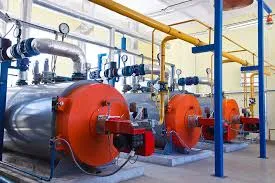
Dec . 09, 2024 16:27 Back to list
Comparison of Steam Boilers and Steam Generators in Industrial Applications
Steam Boiler vs. Steam Generator Understanding the Key Differences
In the world of thermal energy production, the terms steam boiler and steam generator often arise. While both systems are designed to produce steam, they function on different principles and are suited for various applications. This article delves into the key differences between steam boilers and steam generators, helping you understand their unique features, operational principles, and ideal uses.
Definition and Functionality
A steam boiler is a closed vessel that heats water to create steam through the combustion of fuels, typically natural gas, oil, or coal. The steam produced in a boiler is usually utilized for heating, power generation, or industrial processes. Boilers operate based on the principle of transferring heat from a combustion source to water, producing steam in a high-pressure environment.
On the other hand, a steam generator is a more compact unit that combines the functions of heat generation and steam production in a single system. Steam generators typically operate at lower pressures and are often electric-powered, allowing them to generate steam rapidly. These devices are commonly employed in applications demanding on-demand steam generation, such as in small-scale industrial processes or for sterilization purposes in healthcare settings.
Design and Construction
One of the main differences between steam boilers and steam generators lies in their design and construction. Steam boilers are generally larger and more complex, consisting of multiple components, including burners, combustion chambers, heat exchangers, and steam drums. They are built to withstand high pressures and temperatures, ensuring safety and efficiency in steam production.
Conversely, steam generators are designed for efficiency and ease of use. They are typically smaller, using a compact design that facilitates rapid heating and steam production. The heat exchanger's design in a steam generator allows for quick transfer of heat to water, enabling steam to be generated almost instantaneously. This compact construction makes steam generators ideal for applications where space is limited.
steam boiler vs steam generator

Efficiency and Performance
In terms of efficiency, both steam boilers and steam generators have their strengths. Steam boilers are designed to produce a large volume of steam consistently and can operate continuously for extended periods. Their efficiency can be affected by factors such as fuel quality, maintenance, and operating conditions. Modern advancements in boiler technology have led to the development of high-efficiency boilers that offer reduced fuel consumption and lower emissions.
Steam generators, owing to their smaller design and rapid heating capabilities, excel in efficiency for short-duration or intermittent steam needs. They are particularly useful in operations that require quick steam availability without the extensive startup times associated with larger boilers. Their performance is optimal for applications requiring precise control over steam quality and quantity.
Applications
When considering applications, steam boilers are typically employed in large-scale industries, such as power plants, manufacturing facilities, and chemical processing plants. They are essential for providing thermal energy for processes that require substantial and consistent steam generation.
Steam generators, meanwhile, are often used in settings where rapid and flexible steam generation is necessary. Common applications include food processing, small-scale sterilization in hospitals, and certain laboratory experiments. Their ability to produce steam quickly makes them invaluable in scenarios where immediate steam supply is crucial.
Conclusion
In summary, understanding the differences between steam boilers and steam generators is essential for selecting the right system for specific applications. While steam boilers are designed for large-scale, continuous steam production in industrial environments, steam generators cater to smaller, on-demand steam needs. By recognizing these distinctions, industries can optimize their thermal energy systems, ensuring efficiency and effectiveness in their operations. Whether choosing a steam boiler or a steam generator, the decision will ultimately depend on the specific requirements of the application, including steam volume, pressure needs, and operational flexibility.
-
Efficient Biomass Fired Hot Water Boiler | AI Heating Solution
NewsAug.01,2025
-
High-Efficiency Gas Thermal Oil Boilers | HPT Models
NewsJul.31,2025
-
Oil Fired Hot Water Boilers Sale - High Efficiency & Affordable
NewsJul.31,2025
-
High-Efficiency Commercial Oil Fired Steam Boiler for Industry
NewsJul.30,2025
-
High-Efficiency Biomass Fired Thermal Oil Boiler Solutions
NewsJul.30,2025
-
High Efficiency Gas Fired Thermal Oil Boiler for Industrial Heating
NewsJul.29,2025
Related PRODUCTS






















